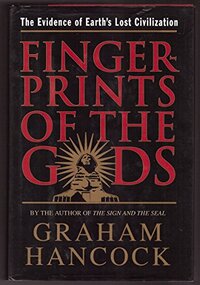Take a photo of a barcode or cover
Well that was Ancient Aliens in book form. Even within the book it corrects statements it made in the beginning as fact.
OK, started off pretty good, but progressed into a harder read. Some of the ideas he puts forth seem perfectly reasonable though, although this is far from real science. Interesting and thought provoking for the casual backyard scientist though. Graham is accused of meddling where he doesn't belong in some circles, but I think provoking more though from varied angles is a good thing if put in the proper perspective.
Once you suspend disbelief it is a riveting story. I think there is some truth to some of it (i.e. the pyramids lining up with constellations etc.) but a lot of it is just Graham following the fairy trails of his brain. I'll probably read more of these books though, because they are fun.
Could the history of mankind be much older than we originally thought? Graham Hancock explores the evidence that there were advanced civilisations existing during the time of the last ice age - and the compelling idea that our perceptions of well-known ancient civilisations (like Egypt and the Incas) are much older too. Having read his other books, I knew I would have to read his original work soon and now seemed as good a time as any to complete it.
I’ve always been fascinated by prehistoric man – that is, man’s ancient history that precedes written records. It’s striking that, in our present form, human beings have been around for at least 75,000 years, but our written record and thus our best connection to the past only goes back a little over 5,000 years. Beyond those dates we have to rely on whatever our ancestors left behind – their trash, their tools, their settlements, and their mythologies.
I don’t think I’d ever have bought Fingerprints of the Gods on my own, but it was given to me as a gift by family who know I’m interested in history. And I’ll admit, while skeptical, I was intrigued. The reason for my amusement was because Fingerprints is a detailed narrative about a journalists’ search for evidence of an ancient civilization lost to history, that, in his view, pre-dated the Egyptians by thousands of years and achieved a level of technological and scientific advancement not matched until our contemporary society. From the History channel to AMC, pseudo-scientific history is trendy today, but Hancock wrote this book 25 years ago, and his background as a respected journalist for the Economist afforded him some level legitimacy in my mind.
Unfortunately I came away from Fingerprints of the Gods with significant problems. To put it nicely, the book is too ambitious given the weight of its evidence. But let’s start with the writing.
Part travel narrative, Hancock introduces his evidence by recounting his visits to historical locations around the world. This approach captured my attention at first, but it quickly became a distraction from his thesis. He is also repetitive, often making the same point and asking the same questions in multiple chapters. That said, Fingerprints is engaging and for the most part well written, if not exactly well reasoned, but we’ll get into that. First, there were some redeeming qualities that I think are worth mentioning.
Hancock highlights interesting historical anomalies that could have intriguing implications for the current accepted timeline of ancient history. Some of these points include: the hypothesis that Ancient cataclysm mythologies from around the world could be a historical record of mankind’s’ experience during the last Ice Age (which ended around 9000 BC); evidence that the Sphinx in Egypt was subject to a significant amount of water erosion, possible only in a climate that pre-dates the dynasties of Ancient Egypt; detailed maps of what seems to be Antarctica that were created hundreds of years before it was discovered. There are others, but these points in particular fascinated me, and who knows? There could be kernels of truth there that are worth exploring.
Unfortunately I also found that Hancock tends to make mountains of molehills, and that he has no problem with a “Gods of the gaps” approach to history. I was routinely disappointed and surprised how evidence that I found only moderately interesting, tenuous or even irrelevant led him to absolute conviction about their historical implications. When viewed broadly, the evidence he strings together make for an interesting narrative, but the foundation of that narrative is based on conclusions that require enormous leaps of faith on the part of the reader. For instance, he insists that because maps that predate the discovery of Antarctica seem to show Antarctica before it was covered in ice, that must mean that someone mapped Antarctica 15,000 years ago using precise cartographic techniques rivaled only in modern times. Never mind the possibility that the same historical maps are riddled with other geographical inaccuracies, and it's possible that he's misinterpreting one of those. The presence of what seems to be Antarctica in the maps is not by itself conclusive evidence of anything; it's no more than a potential reason to look into it further.
Perhaps most damning is Hancock’s oblivious hypocrisy regarding his conflicts with “mainstream” historians. He pokes small holes in the current accepted timeline of human history and then lambasts mainstream archaeology for not considering the problems with their timeline, but expresses absolutely no doubt in his own hypotheses, despite the gargantuan gaps in his logic. Why would a modern archaeologist take his conclusions seriously when Hancock himself seems unable to impartially consider the facts?
In the end, Hancock’s forceful conclusions from a small amount of evidence undermine his legitimacy. His fanatic conviction, especially in his concluding chapter, is almost religious, and the entire book is laced with ill-fitting, superstitious themes that are at odds with the evidence-based, scientific treatise he sought, by his own admission, to write.
I have no doubt that many of the assumptions that modern historians make about human history will be proven wrong as we learn more about our past – history has a way of surprising us. And I’m grateful that I read this book because it did give me some insight into some possible areas for a breakthrough. But Fingerprints of the Gods has an unfounded, superstitious conviction in an alternate history that is based on evidence that is no more than mildly intriguing. Don't waste your time.
I don’t think I’d ever have bought Fingerprints of the Gods on my own, but it was given to me as a gift by family who know I’m interested in history. And I’ll admit, while skeptical, I was intrigued. The reason for my amusement was because Fingerprints is a detailed narrative about a journalists’ search for evidence of an ancient civilization lost to history, that, in his view, pre-dated the Egyptians by thousands of years and achieved a level of technological and scientific advancement not matched until our contemporary society. From the History channel to AMC, pseudo-scientific history is trendy today, but Hancock wrote this book 25 years ago, and his background as a respected journalist for the Economist afforded him some level legitimacy in my mind.
Unfortunately I came away from Fingerprints of the Gods with significant problems. To put it nicely, the book is too ambitious given the weight of its evidence. But let’s start with the writing.
Part travel narrative, Hancock introduces his evidence by recounting his visits to historical locations around the world. This approach captured my attention at first, but it quickly became a distraction from his thesis. He is also repetitive, often making the same point and asking the same questions in multiple chapters. That said, Fingerprints is engaging and for the most part well written, if not exactly well reasoned, but we’ll get into that. First, there were some redeeming qualities that I think are worth mentioning.
Hancock highlights interesting historical anomalies that could have intriguing implications for the current accepted timeline of ancient history. Some of these points include: the hypothesis that Ancient cataclysm mythologies from around the world could be a historical record of mankind’s’ experience during the last Ice Age (which ended around 9000 BC); evidence that the Sphinx in Egypt was subject to a significant amount of water erosion, possible only in a climate that pre-dates the dynasties of Ancient Egypt; detailed maps of what seems to be Antarctica that were created hundreds of years before it was discovered. There are others, but these points in particular fascinated me, and who knows? There could be kernels of truth there that are worth exploring.
Unfortunately I also found that Hancock tends to make mountains of molehills, and that he has no problem with a “Gods of the gaps” approach to history. I was routinely disappointed and surprised how evidence that I found only moderately interesting, tenuous or even irrelevant led him to absolute conviction about their historical implications. When viewed broadly, the evidence he strings together make for an interesting narrative, but the foundation of that narrative is based on conclusions that require enormous leaps of faith on the part of the reader. For instance, he insists that because maps that predate the discovery of Antarctica seem to show Antarctica before it was covered in ice, that must mean that someone mapped Antarctica 15,000 years ago using precise cartographic techniques rivaled only in modern times. Never mind the possibility that the same historical maps are riddled with other geographical inaccuracies, and it's possible that he's misinterpreting one of those. The presence of what seems to be Antarctica in the maps is not by itself conclusive evidence of anything; it's no more than a potential reason to look into it further.
Perhaps most damning is Hancock’s oblivious hypocrisy regarding his conflicts with “mainstream” historians. He pokes small holes in the current accepted timeline of human history and then lambasts mainstream archaeology for not considering the problems with their timeline, but expresses absolutely no doubt in his own hypotheses, despite the gargantuan gaps in his logic. Why would a modern archaeologist take his conclusions seriously when Hancock himself seems unable to impartially consider the facts?
In the end, Hancock’s forceful conclusions from a small amount of evidence undermine his legitimacy. His fanatic conviction, especially in his concluding chapter, is almost religious, and the entire book is laced with ill-fitting, superstitious themes that are at odds with the evidence-based, scientific treatise he sought, by his own admission, to write.
I have no doubt that many of the assumptions that modern historians make about human history will be proven wrong as we learn more about our past – history has a way of surprising us. And I’m grateful that I read this book because it did give me some insight into some possible areas for a breakthrough. But Fingerprints of the Gods has an unfounded, superstitious conviction in an alternate history that is based on evidence that is no more than mildly intriguing. Don't waste your time.
mysterious
slow-paced
informative
slow-paced
informative
mysterious
slow-paced
slow-paced
adventurous
mysterious
medium-paced



